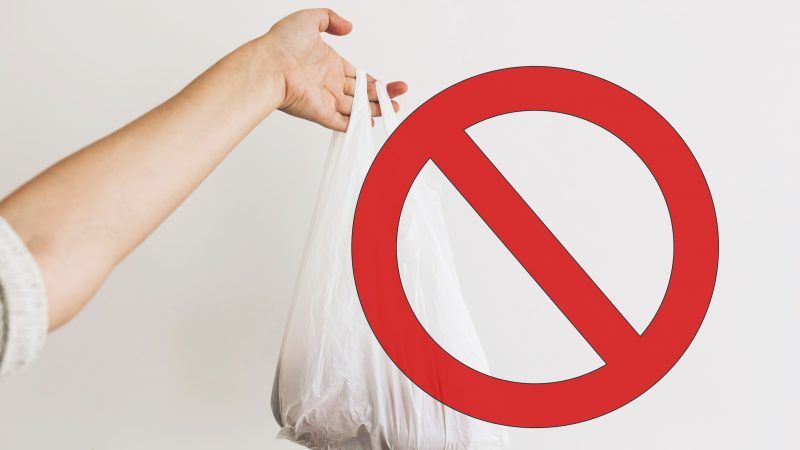New Jersey Politician Wants To Ban All Bags—Paper or Plastic
The Garden State's plan to ban all grocery store bags could have negative consequences for consumer convenience and the environment.

In August 2018, New Jersey Gov. Phil Murphy, a Democrat, vetoed a bill that would have imposed a five-cent fee on both paper and plastic carryout bags, arguing that the legislation did not do enough to protect the Garden State's famed natural beauty.
"Single-use carryout bags—particularly plastic bags—represent a significant source of the litter that clutters our communities and mars New Jersey's beautiful shoreline and parks," wrote Murphy in his veto statement. "Instituting a five-cent fee on single-use bags that only applies to certain retailers does not go far enough."
State legislators have clearly heard this message, floating proposals to ban not just plastic grocery bags, but all single-use bags—paper or plastic.
Working its way though the legislature right now is S2776. As written, the legislation would ban food service businesses and other retailers who have stores larger than 1,000 square feet from providing their customers with plastic bags. The bill would also naturally ban plastic straws.
Violators would be fined anywhere from $500 to $5,000 depending on the number of offenses.
The bill passed one state Senate committee back in September 2018 but has been idling in the legislature ever since.
That was until late last week, when Sen. Bob Smith (D–Middlesex), one of the bill's sponsors, announced his intention to amend S2776 to ban these same stores from handing out paper bags too. The idea, Smith says, came to him while on vacation in Aruba, where a similar bag ban is in effect.
"Nobody's grumbling," the senator told NJ.com, saying that the Arubans have really taken to bringing their own reusable bags to the store. "Everybody in the line, they all do it."
NJ.com reports that Aruba has a ban on retailers handing out plastic bags, and imposes a roughly 28-cent fee on paper bags.
According to Smith's comments on his yet-to-be released amendment, his bag ban would be more radical still. "No bags whatsoever … No single-use plastic, no paper," he said to NJ.com.
Smith stands a good chance of getting his paper bag ban through. He claims to already have the support of Senate leadership. The state's grocery store association is also on board with the policy.
Still, one wonders what the practical effects of Smith's amendment, as well as the wider plastic bag ban, will be.
A recent study of plastic bag bans in California found that the policy—while still reducing plastic bag consumption overall—did lead to a 120 percent spike in the purchase of smaller garbage bags.
As it turns out, the single-use plastic bags people used at the grocery store were hardly single-use at all, but rather were reused to line waste baskets or clean up after pets. When the free option disappeared, people simply started purchasing unprohibited garbage bags.
New Jersey's bag ban would seem to have a similar potential for this kind of substitution. While it bars stores from handing out thinner plastic bags, it still allows them to provide customers with plastic tote bags provided they're thicker than 10 mils.
As written, stores could well end up ditching their current carry-out bags for another type of thicker plastic bag, which would seemingly increase overall plastic consumption.
Smith's amendment has yet to be released, so it's possible that the thicker plastic bags will be stripped out of the bill as well. The senator's stated goal is to get people bringing their own reusable tote bags to the store.
That too could have negative consequences for the environment.
When accounting for the emissions and energy required to produce them, things like cotton tote bags are far worse for the environment. That same study of California's bag bans found that reusable cotton bags would have to be reused 131 times in order to have the same impact on the climate as single-use plastic bags.
That's a long time for a tote bag to last. Should one be damaged, lost, or forgotten at home, shoppers will have to buy another one, worsening their impact on the climate.
In all fairness, New Jersey's bag banners are more focused on fighting litter, not global warming, with this bill, and one could easily imagine that there would indeed be less stray trash in a world without single-use bags.
However, it's also possible that a total bag ban could encourage more littering in some instances, as shoppers would have no ready receptacle to collect the wrappers, cups, or containers that came with their purchase.
Items like candy wrappers, cups, and miscellaneous papers are already more likely to be littered than bags of any kind according to a survey of the state's roadside litter.
Plastic litter, and litter in general, is a problem. I don't begrudge New Jersey's politicians for being concerned with the aesthetic appeal of their state.
That said, a ban on all single-use bags is the height of nanny statism, and could well be counterproductive to the state's environmental goals.
Rent Free is a weekly newsletter from Christian Britschgi on urbanism and the fight for less regulation, more housing, more property rights, and more freedom in America's cities.


Show Comments (129)